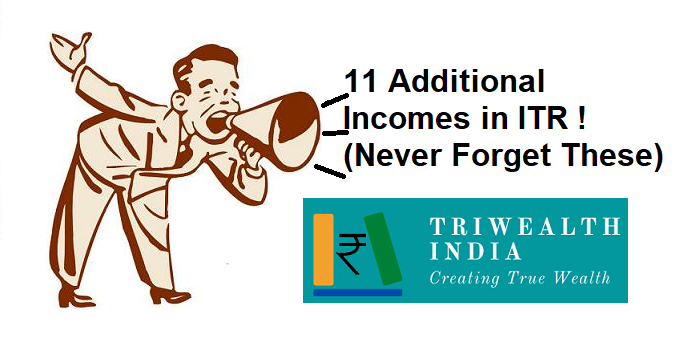You are on brink of filling your Annual Returns or ITRs for AY 2021-22. The date has been extended to 30 Sept 2021 due to COVID wave 2. But you should keep the following income in mind to include in case you get in the financial year. These are some Additional Incomes in ITR to filled & include in the annual return statement.
The question in your mind will be – These are small incomes… Income Tax Department will not bother me .. Aren’t they busy catching big fishes…
Well, they like every fish they can catch!
2 Reason Why to Include Additional Incomes in ITR
Reason 1: Historically Assesses have received notices for non-compliance.
Reason 2: Now many of these incomes will e included in Annual Information (form 26 AS) and will be prefilled in ITR forms.
Additional Incomes in ITR – You normally miss these-

- Capital Gains: Some investors think that only withdrawing means capital gains will occur. Capital Gain occurs on switches from one scheme to another also. Even in STP when small amounts move from one scheme to another there are capital gains on the profit made in the source scheme. One must ask for a complete capital gain statement from his advisor to include these incomes in the ITR.
- Fixed deposits which are automatically renewed: The FDs which are renewed on maturity with the principal + interest, the interest needs to be included in your income. This may not get credited in your bank account but is your income.
- Interest from Savings Bank Accounts: You will say you comply but do you add interest given by Small Finance Banks & Small Payment Banks. Many small finance banks act like app or a wallet and pay you interest. You should show this in your income. You get a benefit on this interest under Section TTA & TTB. But do not forget to include these.
- Interest from FD for locker: Most of us have Lockers against an FD. This is a trick used by bankers to sell FD and ensure rent for the locker for the coming years. But the Interest that you get is your income even if you are paying locker charges against it. You must include this every year in your returns. If the amount of interest is below 10000 the bank will also not deduct a TDS, then also interest must be added to income.
- Interest Received on Refund of Bonds or Application Money: This is a rare Additional Incomes in ITR these days. Many financial institutions pay you interest in case the bond issue takes time or the application money is refunded. Many government institutions issue bonds like this. The interest that is received with the refund amount should be included with the interest income for that financial year.
- Payment Received from FDs kept as security: Many suppliers or utility providers keep security FDs. These FD interests are paid to subscribers or adjusted in their bills. You must add this amount and show it in your income.
- Last year’s interest received on NSC: Interest income on NSC can be reinvested and can be counted as an investment under Sec 80. But in the last year before maturity, the last year’s interest is paid with the maturity amount and is not counted as reinvested. This amount should be added as interest income to the subscriber.
- PPF Interest: PPF interest every year is left without declaring. It is tax-free. But correct way is that one must declare it every year and take the exemption.
- Interest Received on Income Tax Refund: Income Tax refunds are not taxable. But interest received with this tax amount if in the case is received in hands is taxable and must be declared. The Income Tax department pays interest on delayed refunds only.
- Income in name of child: Any income in excess of INR 1500 in name of child needs to be clubbed with the parent (with the highest income). This income can be due to some investments in name of child or child earnings from work.
- Income (Notional) from more than 2 house properties: Upto 2 houses are allowed as self-occupied. But if you have more than 2 houses the third one and all others will be taxed for rental income. It will be deemed that you have earned rent on those. The rent is also not what you have received but the market rent. I will soon write a detailed post on income from house property.
It is being observed that fillers neglect or forget the income that is not mentioned in Form 16 or 26AS. But this is being on the wrong side of the law. Remember Income Tax in India is Self Assessment method. You make the assessment. So you face fallout in case you leave an income due to an error of omission or commission.
Do email me or ask your queries in the comments section below.








